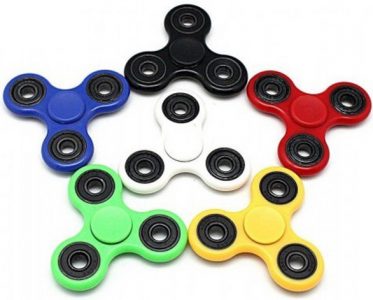“Fidget spinners are going to enable ADHD students to focus”
“Fidget spinners are creating ADHD and must be banned from school”
At the time of this writing the owning of a fidget spinner has gone viral, and with hundreds of schools banning fidget spinners, it looks like the spinner ban will go viral soon too. I must be missing a key piece of information because I do not understand the ban. What is notably absent is the scientific research demonstrating either claim.
![]() But even more importantly the educational opportunity is being missed.
But even more importantly the educational opportunity is being missed.
Is there a physical danger to fidget spinners?
Is there anything morally wrong with a fidget spinner?
So why are schools banning them?
This situation is a great example of the high jacking of education. This was an opportunity to teach children 1) not everyone is the same and therefore does not have the same needs and 2) there is a time and place for everything. I don’t get glasses or braces for all my children just because some of them need it, and you don’t have to let all the students have a fidget toy just because some need it. This has been true for any other accommodation. What we should be doing is teaching the children to respect other peoples’ differences and be supportive of the efforts of others in their strive towards success. But it is much easier to try and control children than teach them. It is an inherent flaw in a society used to instant gratification. Hungry? Your food will be read in a microwave minute. Need to send a letter around the world? Fax or email it in seconds or overnight a hard copy (if you can wait that long). Want the newest song or book? Download instantly, no need to wait until you have time to go to the store. Don’t want to teach children, just want them to be obedient? Institute rules that they must comply with so you don’t have to deal with discipline. Just to be clear I am not talking about rules necessary for everyone’s safety and benefit. If fidget spinners are distracting the class as a whole, they do not need to be allowed during class. Those who need a fidget toy can avail themselves of any of the dozens of other fidget toys out there that are less distracting to others, provided it really is a need for said individual and not a distraction.
But when do we teach children how to handle life’s obstacles with grace and fortitude? When do we fit teaching self-discipline and delayed gratification into our curriculum? How about the resilience to ignore minor irritations (such as the noise of the spinner, should a classmate need to use one)? Collaboration and group problem solving? These skills are arguably more important than any academic area on the report card.
I remember walking into a classroom once and finding six boxes of tissues on the teacher’s desk. She explained that she had confiscated them from those students who were fidgeting with them. This was a few days after a staff development on sensory processing in which the occupational therapist had explained to the teachers that some students need to fidget as it turns their brains on!
![]() You can test whether a behavior (be it fidgeting, thumb sucking, doodling, etc.) is turning your student’s brain on or off by asking him/her a question on the content you are teaching. If they can answer, they are tuned in. If they cannot answer, the behavior is a distraction and the student needs to work on self-discipline.
You can test whether a behavior (be it fidgeting, thumb sucking, doodling, etc.) is turning your student’s brain on or off by asking him/her a question on the content you are teaching. If they can answer, they are tuned in. If they cannot answer, the behavior is a distraction and the student needs to work on self-discipline.
Best,
![]()




I love how realistic and practical your approach and outlook are. Testing for comprehension after a child is observed to be “distracted ” is a great idea. Thanks!